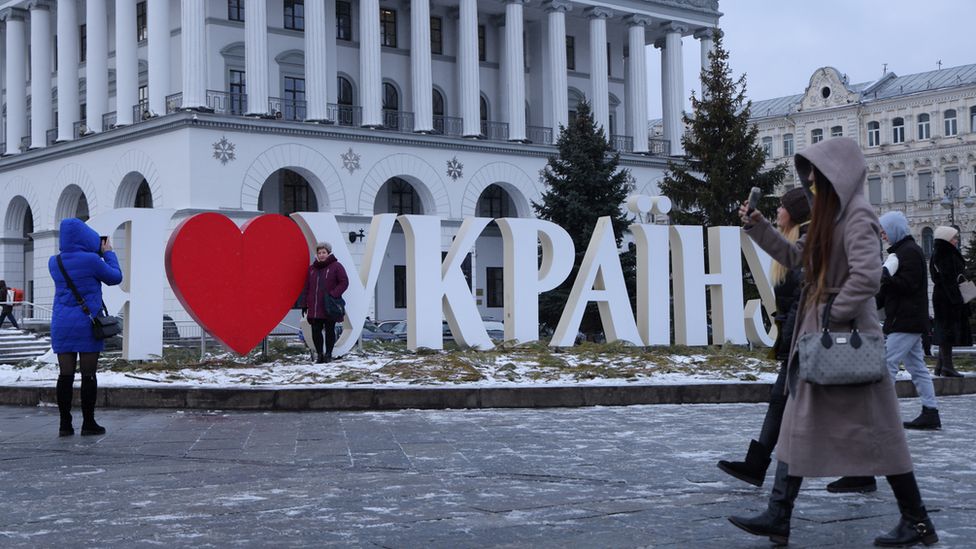As concern grows that Russia will invade Ukraine, BBC correspondents gauge the public mood in Moscow and Kyiv on whether the crisis could lead to a wider war in Europe.


“You can’t interview me I’m kind of famous in Ukraine ha ha!”
OK, I confess I didn’t know who the woman was, but her thoughts didn’t exactly seem preoccupied by a possible invasion on her country.
Her mood is matched by many at the snowy Kyiv food market we cross paths in, which wouldn’t look out of place on a Christmas card.
“Russia can do anything thanks to Putin, who is unpredictable,” says Volodymyr, who’s less concerned about his celebrity status.
“As long as Putin is there, risk will always remain.”
And that’s a sentiment echoed across Ukraine. Since Russia annexed Ukraine’s southern Crimea peninsula and backed militants in the eastern Donbas region in 2014, there’s been no real let-up in fighting, cyber-attacks and misinformation.
Anastasia is more optimistic, saying: “I’m not worried because we have good authorities and our president. I think they can manage it. They protect us, that’s why we elected them.”
Viktor isn’t worried either, but does get basic military training at his university, which is common in Ukraine.
“We’d like it not to happen, but if needed, we’ll be ready to properly resist the aggressor,” he says.
So would he and his friends would be willing to fight?
“Yes, there are no doubts about it,” he replies.
“Because we need to defend our country, our independence, and most importantly, freedom.”


Carrie Davies, BBC News Moscow correspondent
In Russia, state-run newspapers and media outlets blame the West for aggression, mirroring the Kremlin’s language.
While the defence alliance, Nato, and the US warn of an imminent invasion, many people are still unconvinced that war will happen or that it would be to Russia’s advantage.
In central Moscow, some think that the threat has been exaggerated by the West.
“Every year, according to them, Russia plans to invade Ukraine,” said 24-year-old Andrei.
“Meanwhile, we all sit here and listen to the news with eyes wide open and think: ‘Really? Again? Weren’t we supposed to invade last year?’ I think the West is just using this issue for their own interests.”
Olga was adamant that America was to blame for the tension and didn’t see the need for war.
“What do we need Ukraine for? Leave them alone. I could understand it, to produce goods, if we had a need for more markets, more fields, but we have so much space here. We have access to the seaside. So what is it all for?”
America’s proposed sanctions worry some, like Alexei.
“The rouble (Russia’s currency) will fall and people will have it really bad. So this must be avoided. It is not people’s fault, but it will be ordinary people who will be hit,” he said.
Analysts, journalists and politicians are still arguing about what President Vladimir Putin’s long-term intentions really are.
But many in Russia would be taken by surprise if war was to start soon.

Tensions over Ukraine
- EXPLAINED: Is Russia preparing to invade Ukraine?
- FROM KYIV: Ukrainians wait as Russia faces off with the West
- FROM BRUSSELS: EU ‘closest to war’ in decades over Russia-Ukraine crisis
- UK SUPPORT: UK says it is sending weapons to defend Ukraine

This video can not be played
To play this video you need to enable JavaScript in your browser.































